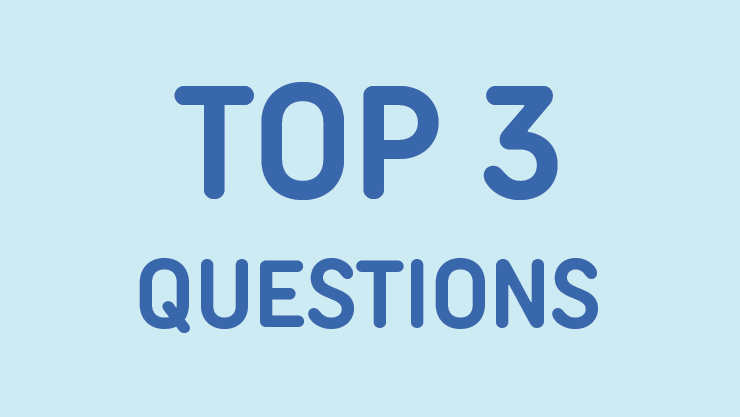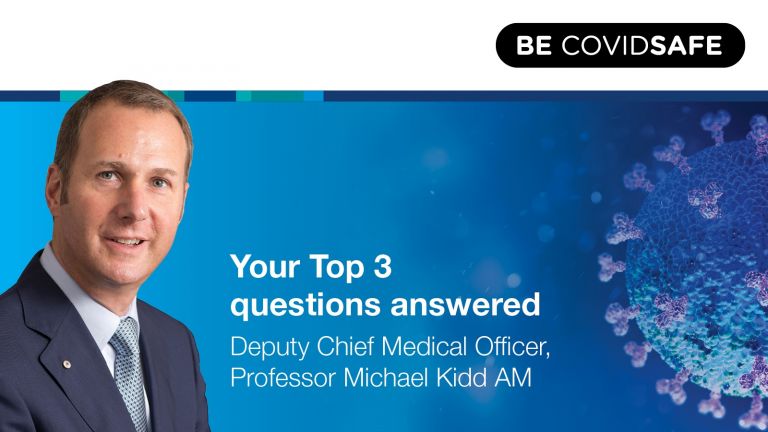
Hello and welcome to today's Top 3. My shout out today is to everybody who is wearing a mask as required by their state or territory in circumstances where we are seeing outbreaks of COVID-19. If you are going to wear a mask, it's really important that you do so properly which means that it covers your mouth and your nose. It's also very important that you put your mask on and take your mask off properly. If you are wearing a reusable mask like the one that I am wearing, please make sure it is washed regularly. If you are wearing a disposable mask, please make sure you dispose of it appropriately into the rubbish. We don't want to see discarded masks in our streets and in our parks. Linda is going to demonstrate how to take your mask off safely and appropriately. It's very important that you don't touch the front of your mask, that you use the loops of your mask to take your mask off and then dispose of it. Some people like to think that perhaps the front of my mask has paint on it and therefore I don't want to get paint on my hands, so therefore you don't touch the front of your mask at any time. Use the loops. Of course, before you put your mask back on, make sure you sanitise your hands so your hands are nice and clean when coming in contact with your face. Thank you, Linda, that was great. Let's get to your questions.
The first question is, how do I know I have recovered from COVID-19?
Now, obviously we want to prevent you from coming into contact with COVID-19. This is why we have all the public health measures in place. But if you are infected with COVID-19, how do you know when you are no longer infectious and no longer affected by the virus? The majority of people with COVID-19 have mild or moderate symptoms. Only about 15% of people with COVID-19 end up having to go to hospital with severe symptoms of COVID-19. For those with mild or moderate symptoms, very often the symptoms have settled and gone away within two weeks of the initial infection. Some people with more severe disease may have symptoms which last a lot longer, and they may still be infectious while they have symptoms. We also have some people who have symptoms which persist long after they are no longer infectious and this is the syndrome we call 'Long COVID'. Symptoms of Long COVID can include being very tired, fatigued, short of breath, not being able to exercise properly, and feeling very cloudy in your mind - what we call brain fog. We are learning more and more about Long COVID about who is affected by it and what may be done to help alleviate the symptoms over time. But obviously the best thing to do is to avoid being infected with COVID-19 in the first place. And that is why it is so important that we follow the public health directions where we are living, and of course that we all arrange to get vaccinated.
The second question is, what are the questions I should be asking when I go to get my COVID-19 vaccine?
So you may go and get your vaccine from your local general practitioner, or from your local pharmacy, or from one of the Commonwealth vaccination centres, or from an Aboriginal community controlled health organisation, or from one of the big hubs which are being set up by the states and territories around the country. Wherever you get your vaccine, your vaccine will be given to you by a health professional. Whether that is a doctor or nurse. And you should feel free to ask whatever questions you need to ask from the person who is giving you the vaccine. Often they will provide you with a printout of the information that we have on the Australian Government website health.gov.au. If you don't get a printout, you can go to the website and we have information there for people who are either about to receive a vaccine or have received their vaccine. The sort of questions you might want to ask include, are there any problems having this vaccine with my other medical conditions? If I get the vaccine, what symptoms can I expect in the day or two after the vaccination? And what should I be looking out for over the coming weeks in case I have a more serious reaction to the vaccine? These are questions that many of us are asking when we are receiving both the first and the second doses of our vaccine. So please, if you have questions, ask your trusted healthcare professional or go to health.gov.au.
The third question is, are there more serious side effects that I should be aware of related to the COVID-19 vaccines?
Now, most people who receive the COVID-19 vaccines only experience mild side effects. And it is not uncommon for a day or two after the vaccine to have a sore arm, maybe a little bit of redness or swelling where the vaccine has been administered. Some people may experience some fatigue, or some aches and pains, or mild fever for a day or two after the vaccine. And some people may get a mild headache. These symptoms are self-limiting. That means they only last for a day or two, important to have lots of fluids and to take some mild painkillers like paracetamol or Ibuprofen if you have these symptoms and they are worrying you. But these symptoms go away. The most serious side effectthat we are concerned about with both the AstraZeneca and the Pfizer vaccines is the risk of allergic reaction. If you're going to have an allergic reaction, this occurs usually within a few minutes of receiving the vaccine. And this is why we require you to wait for 15 minutes so you can be observed after you've had the vaccine to make sure you don't have one of these serious allergic reactions. The allergic reactions can include what we call anaphylaxis, which is where people may have significant difficulty in breathing and fortunately, the people who are administering the vaccines, know how to manage this condition, so in the very rare times that this occurs it is able to be managed very safely and very quickly. There are also some very rare long-term side effects from each of the vaccines and we have talked about these before. For the AstraZeneca vaccine, our concern is the syndrome called thrombosis with thrombocytopenia syndrome, or TTS, also referred to as blood clots. It is important if you have the AstraZeneca vaccine that you know the symptoms of this syndrome, so that if you develop any worrying symptoms, you can seek urgent medical attention. A reminder that this syndrome usually occurs at least four days and up to one month after receiving the AstraZeneca vaccine, and is characterised by unusual and persistent headaches or abdominal pain often associated with other symptoms which may include things like the blurring of your vision, difficulty speaking, sometimes people get rashes as well. If you have these symptoms, it is very important that you seek urgent medical advice and attention. There is a very simple blood test that we can do to exclude this condition, or if it is confirmed, then we know how to manage this condition. But a reminder that this is very rare and the risks of COVID-19, especially in the areas of Australia where we are currently seeing outbreaks, are far more significant than the risks of this side effect. So please, don't delay getting your vaccine. The good news is that we now have more than 50% of people in Australia aged 16 and above who have received at least a first dose of their COVID-19 vaccine. And even better news, among people in Australia aged 70 and above, more than 83% of people have received at least a first dose of their vaccine. So thank you, Australia. Thank you for getting vaccinated against COVID-19. Thank you for protecting yourself, your family, and everybody in our community. Together through our national vaccination program we are actively tackling COVID-19, so thank you for all that you are doing. And a big thank you to Linda.
Top 3 questions
- How do you know if you have recovered from COVID-19?
- What questions should I be asking my health professional about the COVID-19 vaccine?
- Are there more concerning side effects I should look out for after I receive my COVID-19 vaccine?







